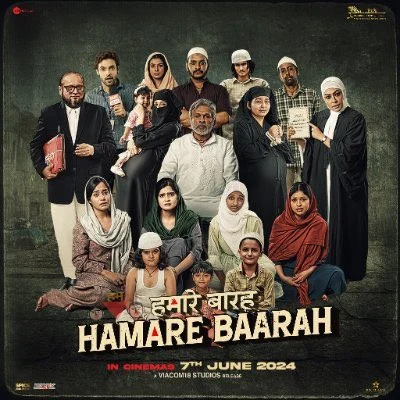‘Humare Baarah’ Sparks Controversy Ahead of Release
NEWS PRISM,
NEW DELHI– Following the backlash faced by recent films such as ‘The Kerala Story,’ and ‘The Kashmir Files,’ for their alleged anti-Muslim narratives, Bollywood’s upcoming film ‘Humare Baarah’ has ignited another controversy. The film, formerly titled ‘Hum Do Humare Baarah,’ has been criticized for its perceived insensitive and inaccurate portrayal of Indian Muslims and Islamic practices.
The film’s trailer, featuring veteran actor Annu Kapoor, has been accused of promoting Islamophobic stereotypes. Contentious dialogues and scenes, including references to large Muslim families and a woman in a burqa questioning why only women go to hell, have drawn sharp criticism. Kapoor’s character, who declares he has 12 children, is seen as perpetuating harmful stereotypes about Muslims being responsible for India’s population issues.
Despite the film’s themes of rising population levels, the trailer has been labeled regressive and insensitive. The backlash intensified when Kapoor claimed the crew received death threats. The trailer, initially released on May 30th, has since been removed from online platforms.
With the film set to release on June 7th, prominent Muslim groups have condemned the portrayal, drawing parallels with other films accused of having an anti-Muslim agenda. Critics argue that ‘Humare Baarah’ could further fuel prejudice and discrimination against Muslims.
Director Kamal Chandra defended the film, stating it explores different interpretations of Islam through a family’s struggle. However, critics highlight the propagation of regressive stereotypes about Muslim families and oppression of women. The film centers on a Muslim man with 11 children facing pressure from his daughter to allow his pregnant wife to have an abortion due to health risks.
The creative team, including Ajendra Ajay as creative director and producers Ravi S. Gupta and Birender Bhagat, expressed pride in the film despite the controversy. As the release date approaches, the debate over ‘Humare Baarah’ continues to escalate, reflecting ongoing tensions around the portrayal of Muslims in Indian cinema.
Leaders, Scholars, and Activists Demand Ban on ‘Humare Baarah’
New Delhi – Muslim leaders, scholars, intellectuals, and activists, including AIMPLB have united to call for a ban on the controversial film ‘Humare Baarah.’ They criticize the film for its portrayal of Muslims and the Quran, deeming it insensitive and harmful.
All India Muslim Personal Law Board (AIMPLB) has called for an immediate ban on the film “Humare Baarah,” condemning it as vulgar, misleading, communal, provocative, and Islamophobic. In a statement, AIMPLB spokesperson Dr. Syed Qasim Rasool Ilyas expressed shock at how the Censor Board approved a film that tarnishes the image of Indian Muslims and attacks Islamic teachings. Dr. Ilyas criticized the film for its title, theme, storyline, and dialogues, stating they not only malign Indian Muslims but also aggressively attack Islam. He highlighted a disturbing trend of defamatory films, referencing “The Kerala Story” and “The Kashmir Files,” which portrayed Muslims as terrorists and Islam as a religion promoting terror. He pointed out that official census data has shown a rapid decline in Muslim birth rates over decades, contrary to the film’s narrative that instills fear about the increasing Muslim population. Dr. Ilyas demanded a ban on the provocative and fabricated film “Humare Baarah” and legal action against the producers, director, and cast for hurting religious sentiments.
Maulana Khalid Saifullah Rahmani, President of All India Muslim Personal Law Board (AIMPLB), labelled the film as propaganda spreading hatred against Muslims through fabricated stories, urging Muslims to counter its negative messaging by spreading true Islamic principles.
Jamiatul Ulama Hind, Maharashtra (Arshad), in a letter to the CBFC, demanded a ban, citing the film’s defamatory content. They warned it could hurt Muslim sentiments and threaten law and order.
Dr. Zafarul-Islam Khan called for protests against the film, accusing it of defaming Islam and Muslim women. He urged Muslims to file petitions in local courts to seek a ban.
Advocate Firoze Ahmad, of AIMMM condemned the film as “venomous and mischievous,” claiming it defames Islam and spreads hatred. He demanded an immediate ban from the Censor Board.
Raza Academy strongly condemned the film, accusing it of mocking Islamic teachings. Raza Academy called it an attempt to malign Islam through propaganda. The Academy’s founder, Alhaj Mohammad Saeed Noori, urged the filmmakers to halt the release to maintain peace.
Dr. SQR Ilyas, President of the Welfare Party of India, described the film as an Islamophobic attack on Muslims based on lies. He criticized the censor board for clearing it and demanded a government ban.
Prof. Akhtarul Wasey termed the film an example of blatant Islamophobia, questioning its claims about Muslim birth rates and urging the government to prevent its release to avoid communal tension.
Mufti Mukarram Ahmed demanded a ban, calling the film false propaganda that insults religious sentiments.
Prof. Tahir Mahmood accused the filmmakers of disrespecting the Quran and Hadith, suggesting they be held legally accountable for hurting religious sentiments.

